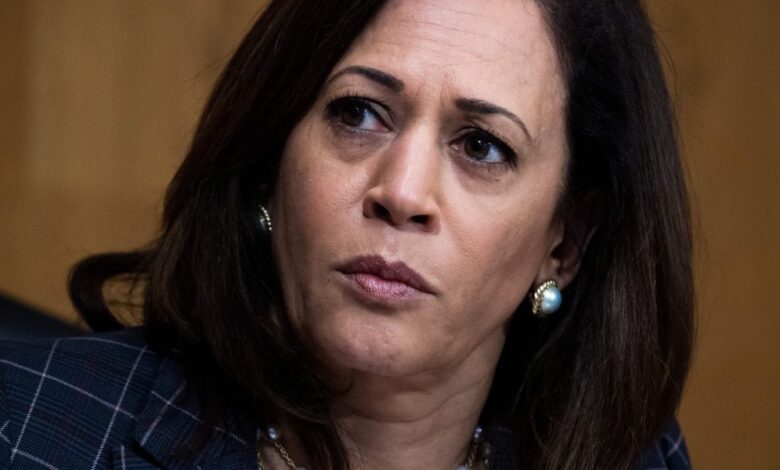Kamala Harris once faced off with Jamie Dimon over a deal for California homeowners. It paid off.


An impromptu phone call between Kamala Harris, then California Attorney General, and JPMorgan Chase CEO Jamie Dimon immediately got into a fight.
“We were like two dogs fighting,” Harris recalled in her 2019 autobiography, The Truth We Hold: An American Journey.
The two sides are sparring over a proposed settlement that major Wall Street banks are negotiating with a group of state attorneys general to provide relief to homeowners who lost their homes to foreclosure during the Great Financial Crisis. The banks, including Wells Fargo, Bank of Americaand JPMorgan Chase, among others, offered between $2 billion and $4 billion in damages to California alone. Harris argued that was not enough, and the banks eventually increased their offer nearly tenfold.
“During the foreclosure crisis, I took on big Wall Street banks and won $20 billion for California families,” Harris said in a campaign speech on Monday, touting the achievement.
In her book, she details a pivotal, albeit tense, conversation with Dimon. Frustrated by the lack of progress in her work with JPMorgan’s general counsel, Harris opted to call Dimon—one of Wall Street’s most respected CEOs—directly, according to her autobiography. As Harris tells it, 10 seconds into the conversation, tempers flared.
“You are trying to steal my shareholders’ money,’ [Dimon] “screamed as soon as he heard my voice,” Harris wrote. Harris responded angrily: “‘Your shareholders? My shareholders are the homeowners in California. Go see them. Talk to them about the people who were robbed.’”
The conversation remained tense until Dimon told Harris he would discuss the issue with his board. Two weeks later, Harris said, the banks had increased their bid nearly tenfold, offering California a deal that would eventually result in $20 billion in homeowner relief.
“I will never know what happened with Dimon,” Harris said. “But I do know that two weeks later, the banks caved.”
Harris and American company reacquaint themselves
More than a decade later, California is epicenter of the country’s housing crisis, and Harris is the incumbent vice president and presumptive Democratic presidential nominee. She received the endorsement of President Joe Biden on Sunday, following his announcement that he would not seek a second term. California’s housing crisis was deepening long before the Great Financial Crisis, but since then, the building collapsed everywhere; of the state house price And rent much higher than the national average and it has largest homeless population in the country. But for Harris, the challenge shows how she is crafting solutions to problems in the housing market, one of the nation’s most intractable, and in a state where the problem is becoming more acute. And it’s also a testament to her approach to working with the corporate world, albeit controversially in this case.
Since her fiery phone call with Dimon in 2011, the two have worked to build a productive relationship. They having lunch at the White House in March, as first reported Financial Times. At the time, the Biden administration’s relationship with corporate America was strained. The president had called for higher taxes on corporations and had taken an extremely tough stance on enforcing antitrust regulations. Harris had previously been much friendlier to corporate America than other Democrats, once reference ARRIVE Google as her “family”. In recent weeks there have been reports that she is flirting with CEOsin the hope that they can avoid from Trump unofficial economics and trade policy.
Harris also leans on senior executives when she feels they can help her achieve policy goals. In 2021, for example, as the Biden administration was distributing pandemic relief loans, she known as CEO of top banksincluding Dimon, to see if they can get them into the hands of low-income borrowers faster, according to Bloomberg.
But as the landlord’s agreement demonstrates, she has not been lenient with big business when it comes to enforcing the law, even though LA times did it once suggest Her settlement was not perfect because the bankers evaded criminal charges.
From $4 billion to $20 billion
It was risky lending practices that caused the subprime mortgage crisis, which led to the financial crisis we now know as the Great Depression. Foreclosures Soar in 2008, and more than 861,000 families lost their homes, CNN reported at the time. That same year, more than 236,000 homes were lost to foreclosure in California alone, based on the LA times.
The deal Harris negotiated was supposed to provide much-needed relief to homeowners affected by the crisis. At one point during the negotiations, Harris abandoned settlement talks altogether, frustrated by the banks’ lowball offer. That move paid off when she eventually negotiated a separate deal for California; in 2012, the banks provided the state with $18.4 billion in debt forgiveness and $2 billion in other financial assistance.
“This outcome is the result of insistence that California receive a fair settlement commensurate with the harm done here,” Harris said at the time, according to a liberate, release, free from the date of the settlement. “We are focused on easing the burden on landlords for Californians and requiring enforcement capabilities so that landlords actually see the benefits of allowing them to stay in their homes and maintaining the ability to investigate banking and loan sharking crimes.”
Under the terms, homeowners could either reduce their mortgage payments or sell their homes for less than they owed the banks, forcing the banks to take the loss. More Californians than expected chose the latter option, critics say failed to meet the spirit of the agreement, which was to help people stay in their homes—not sell them. In 2016 interview with LA Times, Harris said the surprise result was a result of general economic hardship caused by the housing crisis.
“There are a lot of homeowners who don’t want to take on the burden of debt because they’ve also lost their jobs,” she said.




